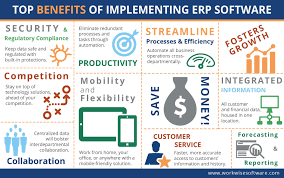Enterprise Resource Planning Skills and Expertise Order Instructions: The assignment is to read the article and add more references regarding the 7 topics I listed below, with respect to successful ERP implementation, and present what you learn from them including your own thoughts or opinion.

Although my order asks for 7 sources, it isn’t completely necessary to have 7. My order requests 7 sources simply because there are 7 topics to discuss, but if the requirement can be satisfied with fewer sources then that’s perfectly acceptable as well. The deadline may also be extended if it becomes necessary.
7 topics to discuss:
– Skills, Knowledge and Expertise
-Top Management Support and Involvement
-Troubleshooting
-Use of a Steering Committee
-User Training
-Vendor Relationship and Support
-Vendor Tools and Implementation Methods
(these are the last 7 topics from the list on page 60 from the attached article)
Enterprise Resource Planning Skills and Expertise Sample Answer
Enterprise resource planning (ERP) has some of the key factors that may contribute to its success or failure. Critical success factors (CSFs) are paramount during the implementation of the system or when a running system needs to be upgraded or replaced. Thus, for any success of the implementation process of ERP, the following factors need to be considered:
Skills, Knowledge, and Expertise
It goes without saying, knowledge is power, for this reason, if people that are taking part of the ERP implementation have prior knowledge about the system. The process of implementation will be smooth, and the overall net change in the system will be at low cost (Hung, 2012). This is because most of the people will not need to undergo the training process. This will make the change in the firm be readily accepted as it will not dig deep into the company’s pocket.
Top Management Support and Involvement
One of the contributing factors to the success of the ERP implementation is the top management’s involvement in its implementation. (Parr, 2013) Urges that, one of the topmost factors that lead to the success of any innovated is accepted by the top management. In particular, the execution of the innovation will be successful as the pressure of its success comes from the leaders in the firm.
Troubleshooting
This involves a critical analysis of the implementation process of the ERP to identify and rectify any problem that may hinder its success (Leyh, 2012). This process will aid in the reengineering process of the old ERP process to a better business process. In support (Ahmad, 2013), states that an ERP system is always built from the best practice after evaluating the worthiness. This troubleshooting process helps in reducing limitations that may occur during implementation, hence revolutionizing the company’s ways and method of production.
Use of a Steering Committee
A steering committee act as ambassadors that ensure the main objectives set for the implementation of the ERP is met. As an illustration (Parr, 2013)states that the top management can be selected to be part of this committee since they help in curbing the greatest mistake made during ERP implementation: poor planning. The committee set aside monitors the progress of the ERP implementation process.
User Training
An inept person cannot be expected to implement properly or execute the plan using methods that are not conversant. Thus, there is a need to train or educate people that are supposed to execute the planned ERP process before the implementation process. This will also help in incorporating persons that are skilled in different fields that are vital in the implementation process. This is also an important process for most of the software used are bolted in the ERP system. Moreover, (Parr, 2013) puts the team skills/availability as the core factor that determines the success of the implementation process of ERP.
Vendor Relationship and Support
Change in any field is inevitable. Thus, a strong relation between vendor supports is a vital thing to the dynamics of the firm. This is because the programs or software running in the ERF system may require updating or fixing due to some code errors. Hence, it is vital that a company maintains a good cohesion with vendors and support that helps in the creation and development of the ERP system (Ngai, 2012).
Vendor Tools and Implementation Methods
This process of adopting vendor’s tool and implementing methods are cheap and time-saving. This is because most of them are readily available the task is only to identify which suits the firm’s needs (Sarker, 2012). The tools need to be carefully examined so that the risk associated with them is estimated. Furthermore, these tools should be chosen only after the vetting or the steering committee have agreed that they will help the implementation of the ERP.
Enterprise Resource Planning Skills and Expertise References
Ahmad, M. M., & Cuenca, R. P. (2013). Critical success factors for ERP implementation in SMEs. Robotics and Computer-Integrated Manufacturing, 29(3), 104-111.
Hung, W. H., Ho, C. F., Jou, J. J., & Kung, K. H. (2012). Relationship bonding for a better knowledge transfer climate: An ERP implementation research. Decision Support Systems, 52(2), 406-414.
Leyh, C. (2012). Critical success factors for ERP system implementation projects: A literature review. Advances in Enterprise Information Systems II, 45-56.
Ngai, E. W. T., Chau, D. C. K., Poon, J. K. L., Chan, A. Y. M., Chan, B. C. M., & Wu, W. W. S. (2012). Implementing an RFID-based manufacturing process management system: Lessons learned and success factors. Journal of Engineering and Technology Management, 29(1), 112-130.
Parr, A. N., Shanks, G., & Darke, P. (2013). 8 IDENTIFICATION OF NECESSARY FACTORS FOR SUCCESSFUL IMPLEMENTATION OF ERP SYSTEMS. New Information Technologies in Organizational Processes: Field Studies and Theoretical Reflections on the Future of Work, 20, 99.
Sarker, S., Sahaym, A., & Bjørn-Andersen, N. (2012). Exploring value cocreation in relationships between an ERP vendor and its partners: a revelatory case study. MIS Quarterly, 36(1), 317-338.




